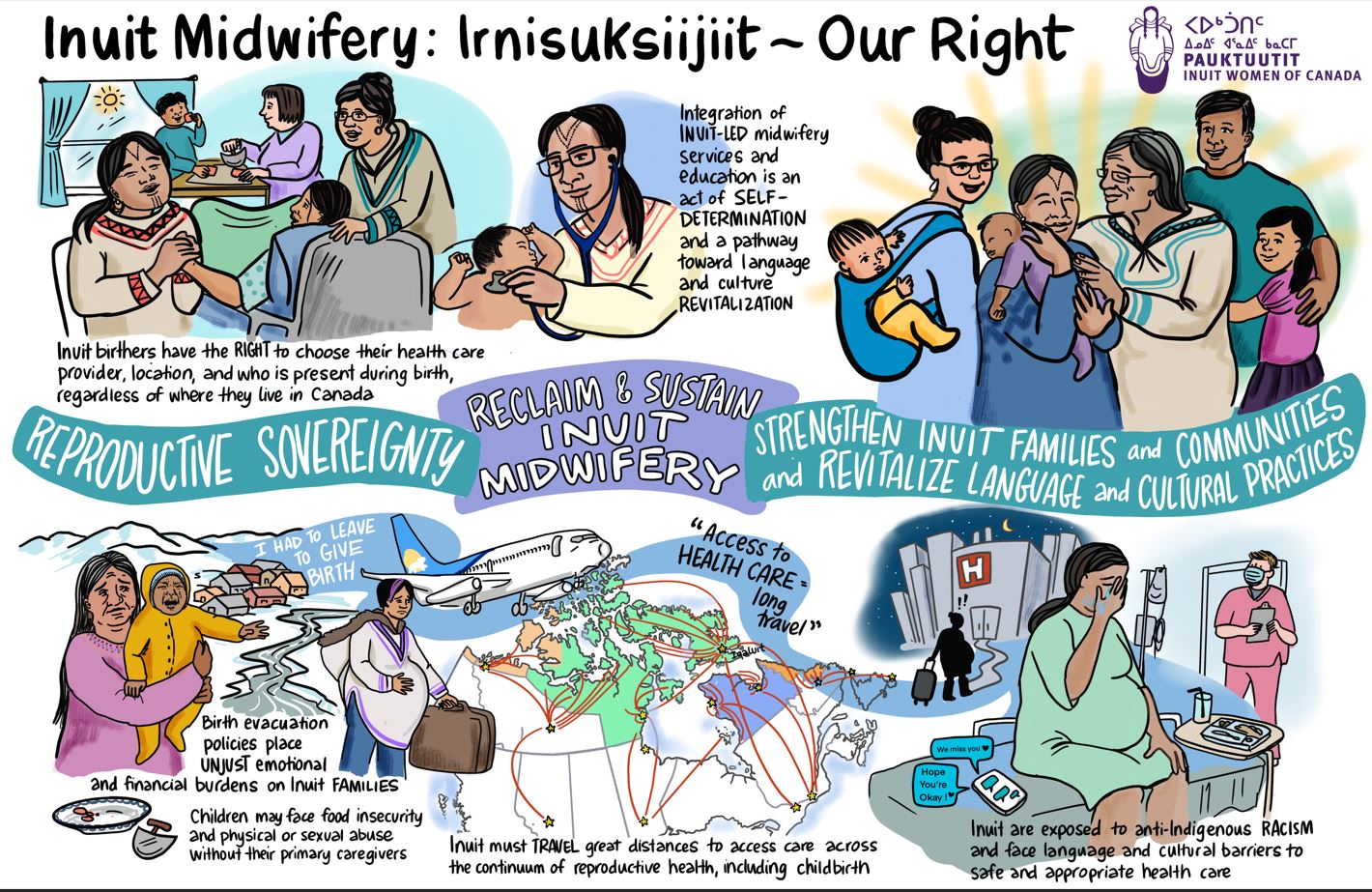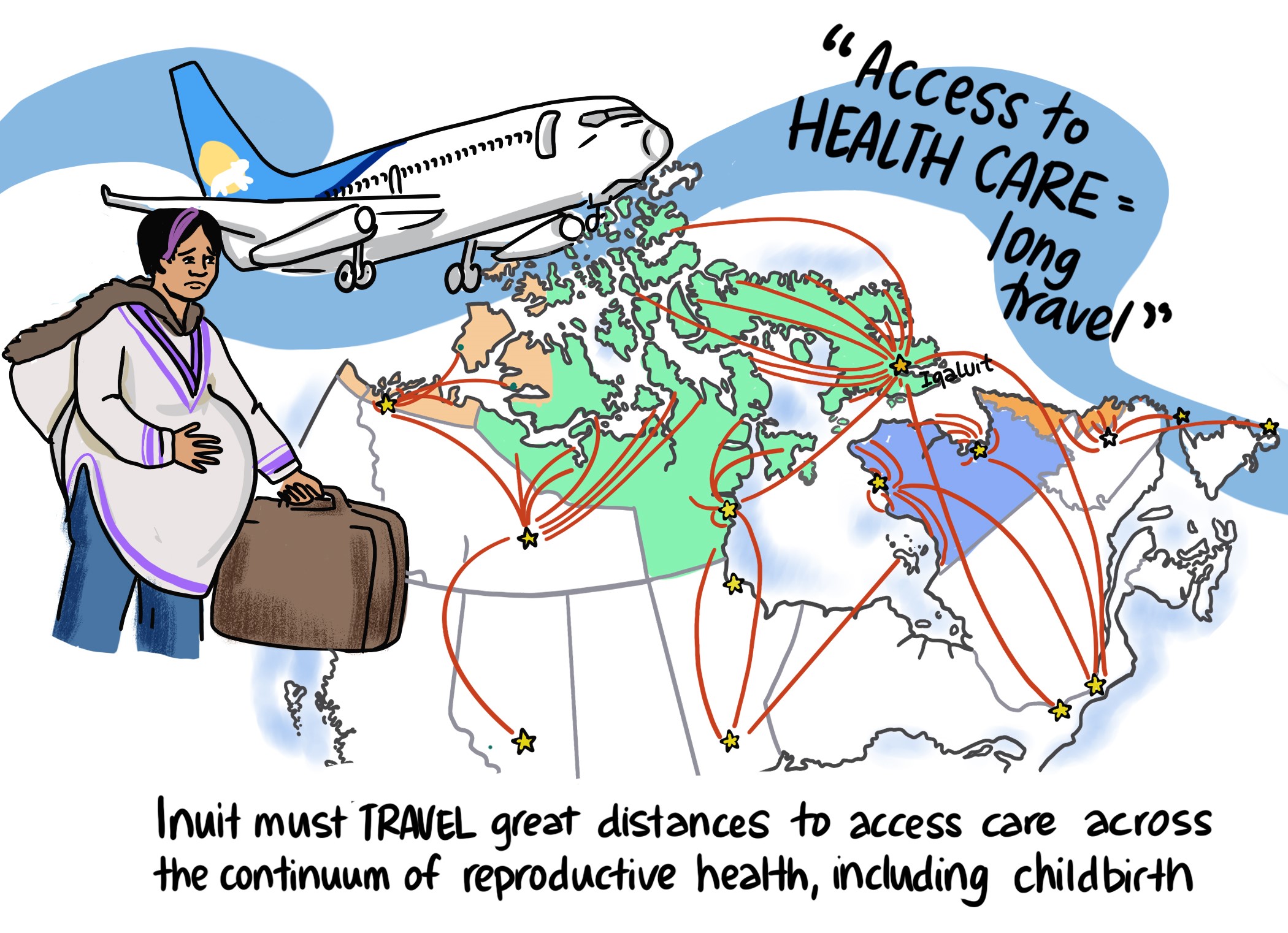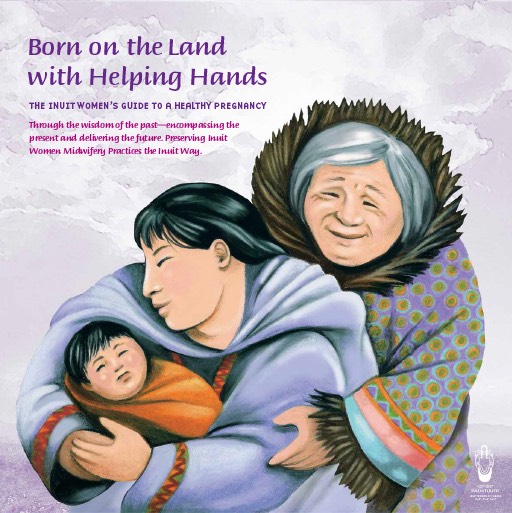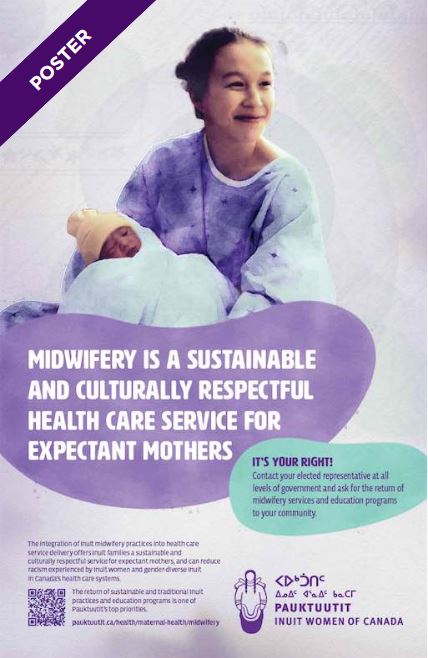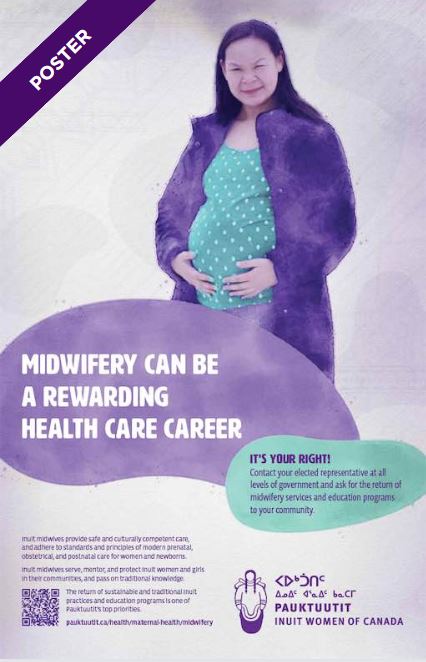Access to midwifery services is a reproductive health right
The return of sustainable and traditional Inuit practices and education programs is one of Pauktuutit’s top priorities.
Access to midwifery services must be recognized as a primary health and cultural right, and Pauktuutit’s efforts should be met with clear legislative and funding commitments. Inuit-centered and culturally appropriate health models and services must be supported by governments with targeted long-term investments to address meaningful progress toward reconciliation.

Inuit Midwifery: Culturally Safe Care for Maternal, Newborn, and Sexual Health
Inuit communities traditionally relied on local midwives for reproductive health care, emphasizing family- and community-centered birthing practices. However, these services have been replaced by Western medical practices, forcing expectant Inuit mothers to relocate to regional hubs or urban centers for the last month of pregnancy, known as maternal evacuation. This disrupts cultural, physical, and emotional well-being, highlighting a lack of access to culturally safe care and the failure of current legislation to support Inuit maternal and newborn health.
Integrating Inuit midwifery practices into healthcare services provides a sustainable, culturally respectful solution, offering safe, competent care and incorporating traditional knowledge to improve health outcomes and reduce anti-Indigenous racism. It also offers meaningful career opportunities for Inuit women, empowering them to serve, mentor, and protect their communities.

National Inuit Midwifery Forum and Framework
Pauktuutit hosted the inaugural National Inuit Midwifery Forum virtually from March 28-30, 2023, emphasizing the critical need for Inuit midwifery services, education, and training across Inuit Nunangat to enable Inuit to give birth closer to home. In partnership with the National Council of Indigenous Midwives (NCIM), the forum discussed key topics such as current challenges in Inuit maternal and child health, the roles of Inuit midwives in community well-being, and the importance of culturally informed midwifery services.
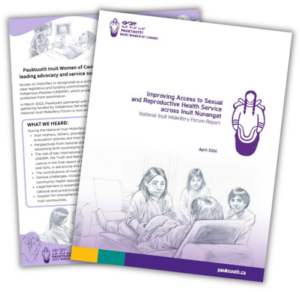 Based on data collected at the forum, Pauktuutit is developing a National Inuit Midwifery Framework to establish next steps in our goal to re-establish traditional Inuit midwifery practices and education programs in Inuit Nunangat. You can read the full report here:
Based on data collected at the forum, Pauktuutit is developing a National Inuit Midwifery Framework to establish next steps in our goal to re-establish traditional Inuit midwifery practices and education programs in Inuit Nunangat. You can read the full report here:
Inuulitsivik - A model for remote maternity care
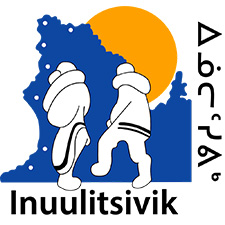 In the remote region of Nunavik, Quebec, the integration of traditional knowledge and modern medicine in midwifery has led to a groundbreaking approach to maternal care. Since 1986, Inuit midwives have been working in maternity departments in Puvirnituq, Salluit, and Inukjuak, offering pre-, peri-, and postnatal care within their communities. This model has significantly reduced the need for Inuit women to travel south to give birth, preserving their cultural and familial connections.
In the remote region of Nunavik, Quebec, the integration of traditional knowledge and modern medicine in midwifery has led to a groundbreaking approach to maternal care. Since 1986, Inuit midwives have been working in maternity departments in Puvirnituq, Salluit, and Inukjuak, offering pre-, peri-, and postnatal care within their communities. This model has significantly reduced the need for Inuit women to travel south to give birth, preserving their cultural and familial connections.
The midwives, who are the primary caregivers throughout pregnancy and up to six weeks postpartum, also provide essential health services beyond childbirth, emphasizing prevention and community health. The training program for Inuit midwives, offered by Inuulitsivik Health Centre, focuses on hands-on clinical experience and is recognized by Quebec’s Ministry of Health and international organizations. Today, 92.2% of deliveries in Nunavik occur within the community, with a remarkably low C-section rate of 2.4%, compared to 23% in southern Quebec. Inuulitsivik midwifery is seen nationally and internationally as a model for remote maternity care and Indigenous midwifery.

Irnisuksiijiit – Our Right – Inuit Midwifery videos
Pauktuutit embraced the traditional Inuit story-telling approach to capture the benefits and challenges related to Inuit midwifery services. Irnisuksiijiit – Our Right, the midwifery advocacy video captures the stories of past and present practices of Inuit midwifery services. It also highlights the challenges, gaps, and potential solutions needed to help ensure midwifery tradition is preserved, and midwifery services are available and accessible for future generations of Inuit.

Hear what our community has to say
Gerri Sharpe, Former President, Pauktuutit
"The absence and inaccessibility of midwifery services to Inuit women is an infringement and violation of their sexual and reproductive health rights, to which the government is obligated to respect, protect, and fulfill. The return of midwifery services and education programs to Inuit communities will help bridge the gap in the disproportionate sexual and reproductive health outcomes and will reduce the anti-Indigenous racism that many Inuit women experience in Canada’s health care systems."
Brenda Epoo, Midwife, Centre de Sante Innlitsivik
"In Nunavik, we fought to return birth and midwifery to our communities. The Inuulitsivik Health Service on the Hudson Coast has had an Inuit midwifery service in Puvirnituq since 1986. The service expanded to Inukjuak in 1998, Salluit in 2004 and Kuujjuaq in the mid 2000’s.
Our service is midwifery led and part of a strong interprofessional team. We have many years of experience providing high quality care and midwifery education in our remote communities. This provides excellent outcomes for women and babies and keeps families together at this important time. As well, we provide care in our language and culture and see the midwifery service as part of healing from colonialism."
Dawn Michelin, Community Nurse, Makkovik, Newfoundland and Labrador
“As a nurse who has been trained in labour and delivery, I have seen how medicalized birthing has become, rather than a natural process. A woman who gives birth in a hospital must ask permission for just about everything she does. She can only have a limited number of family members present and she is at the mercy of hospital staff who do not know her and do not understand her culture or her wishes.
Midwifery would give a woman her autonomy back over the birthing experience. It would also ensure the birth plan is followed, making her delivery experience much more personal and customized.”
Malaya Zehr, Former Pauktuutit Board Member
“I believe that having midwives in Inuit Nunangat is truly important as many of our communities do not have doctors. Expectant mothers and communities would appreciate someone who can speak the language, understand the culture, and hopefully promote midwifery as a career path to our youth which would benefit the entire community.”
Paige Kimiksana Kreps, Urban Inuit Youth Representative, Pauktuutit
“Inuit midwifery addresses the need for more accessible health services within Inuit communities, and our right to determine and promote services by and for Inuit.
Inuit midwifery keeps babies in the community and allows Inuit families to be together at birth and onwards. Inuit have known for time immemorial the traditional practices of birthwork and Inunnguiniq / childrearing and advocating for midwifery programs will strengthen our communities and families.”
Nancy Etok, Interim-President, Pauktuutit
Inuit midwifery is crucial for the wellbeing of the start of life of an Inuk child and it allows mothers to be surrounded by their loved ones when welcoming their baby.

